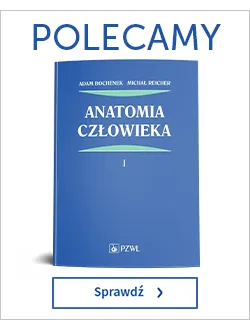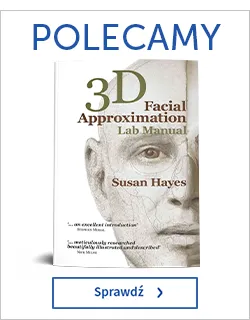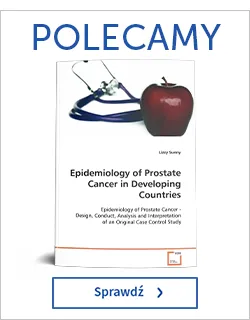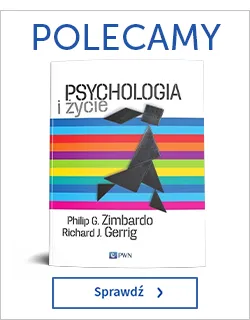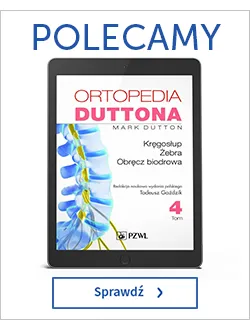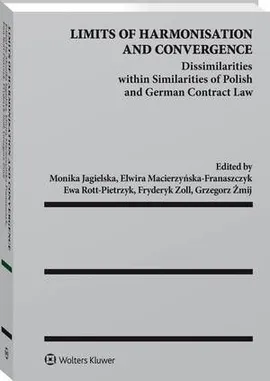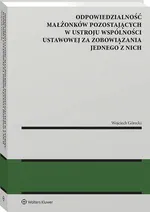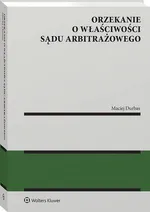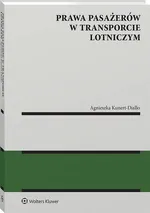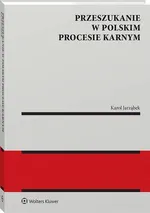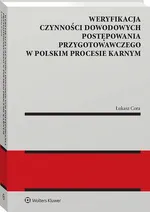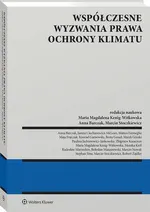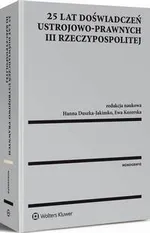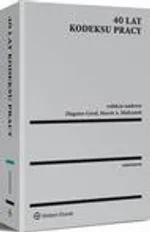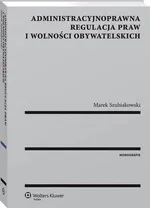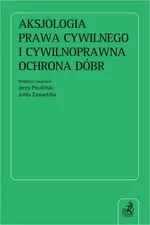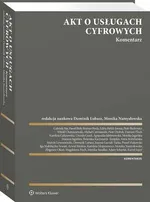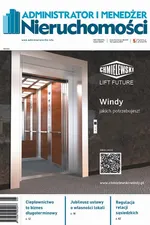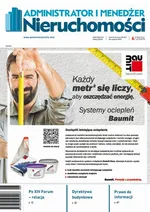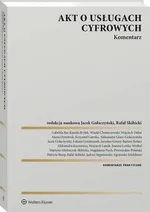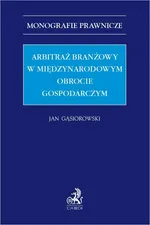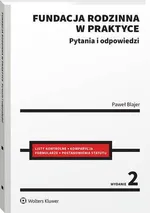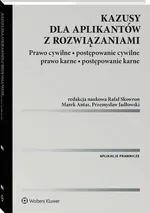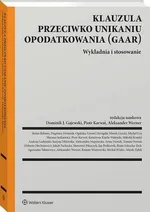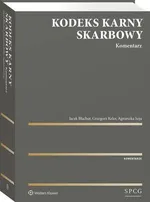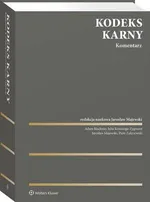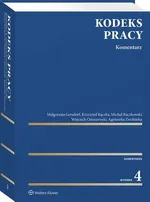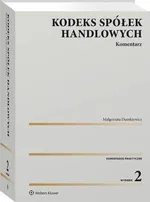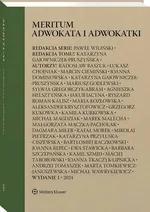- Kategorie:
- Język wydania: polski
- ISBN: 978-83-8124-614-9
- ISBN druku: 978-83-8124-298-1
- EAN: 9788381246149
- Liczba stron: 432
-
Sposób dostarczenia produktu elektronicznegoProdukty elektroniczne takie jak Ebooki czy Audiobooki są udostępniane online po uprzednim opłaceniu (PayU, BLIK) na stronie Twoje konto > Biblioteka.Pliki można pobrać zazwyczaj w ciągu kilku-kilkunastu minut po uzyskaniu poprawnej autoryzacji płatności, choć w przypadku niektórych publikacji elektronicznych czas oczekiwania może być nieco dłuższy.Sprzedaż terytorialna towarów elektronicznych jest regulowana wyłącznie ograniczeniami terytorialnymi licencji konkretnych produktów.
-
Ważne informacje techniczne
-
Minimalne wymagania sprzętowe:
- procesor: architektura x86 1GHz lub odpowiedniki w pozostałych architekturach
- Pamięć operacyjna: 512MB
- Monitor i karta graficzna: zgodny ze standardem XGA, minimalna rozdzielczość 1024x768 16bit
- Dysk twardy: dowolny obsługujący system operacyjny z minimalnie 100MB wolnego miejsca
- Mysz lub inny manipulator + klawiatura
- Karta sieciowa/modem: umożliwiająca dostęp do sieci Internet z prędkością 512kb/s
-
Minimalne wymagania oprogramowania:
- System Operacyjny: System MS Windows 95 i wyżej, Linux z X.ORG, MacOS 9 lub wyżej, najnowsze systemy mobilne: Android, iPhone, SymbianOS, Windows Mobile
- Przeglądarka internetowa: Internet Explorer 7 lub wyżej, Opera 9 i wyżej, FireFox 2 i wyżej, Chrome 1.0 i wyżej, Safari 5
- Przeglądarka z obsługą ciasteczek i włączoną obsługą JavaScript
- Zalecany plugin Flash Player w wersji 10.0 lub wyżej.
-
Informacja o formatach plików:
- PDF - format polecany do czytania na laptopach oraz komputerach stacjonarnych.
- EPUB - format pliku, który umożliwia czytanie książek elektronicznych na urządzeniach z mniejszymi ekranami (np. e-czytnik lub smartfon), dając możliwość dopasowania tekstu do wielkości urządzenia i preferencji użytkownika.
- MOBI - format zapisu firmy Mobipocket, który można pobrać na dowolne urządzenie elektroniczne (np.e-czytnik Kindle) z zainstalowanym programem (np. MobiPocket Reader) pozwalającym czytać pliki MOBI.
- Audiobooki w formacie MP3 - format pliku, przeznaczony do odsłuchu nagrań audio.
-
Rodzaje zabezpieczeń plików:
- Watermark - (znak wodny) to zaszyfrowana informacja o użytkowniku, który zakupił produkt. Dzięki temu łatwo jest zidentyfikować użytkownika, który rozpowszechnił produkt w sposób niezgodny z prawem.
- Brak zabezpieczenia - część oferowanych w naszym sklepie plików nie posiada zabezpieczeń. Zazwyczaj tego typu pliki można pobierać ograniczoną ilość razy, określaną przez dostawcę publikacji elektronicznych. W przypadku zbyt dużej ilości pobrań plików na stronie WWW pojawia się stosowny komunikat.
Limits of Harmonisation and Convergence. Dissimilarities within Similarities of Polish and German Contract Law
(eBook)-
Druk: 2018
-
Seria / cykl: MONOGRAFIE
-
Autor: Elwira Macierzyńska-Franaszczyk, Ewa Rott-Pietrzyk, Fryderyk Zoll, Grzegorz Żmij, Monika Jagielska
-
Wydawca: Wolters Kluwer Polska SA
-
Formaty:
PDF (Watermark)WatermarkZnak wodny czyli Watermark to zaszyfrowana informacja o użytkowniku, który zakupił produkt. Dzięki temu łatwo jest zidentyfikować użytkownika, który rozpowszechnił produkt w sposób niezgodny z prawem. Ten rodzaj zabezpieczenia jest zdecydowanie najbardziej przyjazny dla użytkownika, ponieważ aby otworzyć książkę zabezpieczoną Watermarkiem nie jest potrzebne konto Adobe ID oraz autoryzacja urządzenia.
Limits of Harmonisation and Convergence. Dissimilarities within Similarities of Polish and German Contract Law
In 2015 the European legislator stopped the legislative process concerning the Common European Sales Law. The fully-fledged autonomous European system of contract law met with a mixed reception among the EU Member States. The European Union decided to continue the process of harmonization of the laws by spot legislation complementing the traditional national systems. Despite the progressive development of the acquis communautaire, there is still the need for further harmonization of the law of contracts. The differences between national systems of contract law give rise to numerous impediments in the internal market. Even seemingly similar laws result in different interpretations and solutions in particular cases. The identical legal rules are not a guarantee of its exact understanding in different states. This is clearly visible even in the case of neighbouring countries with a similar legal tradition, like Poland and Germany. Despite the fact that the German law has often inspired the Polish doctrine and case law and the German method of legal reasoning has impacted the Polish jurisprudence, these two systems are in many aspects quite different from each other. The existing dissimilarity and at the same time proximity of Polish and German contract law make a fascinating field for legal analysis. In the book we examine Polish and German law from the perspective of case law. The core of the analysis are German cases concerning various legal issues resulting from the lack of conformity in the contract of sale, specific work contract and donation contract. The main findings of the German cases are subsequently analysed with reference to the substantive Polish law. The adopted method of analysis makes this book the unique and inspiring collection of comparative arguments and reflections on law and methods of legal reasoning adopted in Germany and Poland. The book is recommended to academics and legal practitioners in the field of contract law. It is also invaluable for Polish and German judges as a source of comparative argumentation derived from German and Polish law.
W 2015 r. ustawodawca europejski wstrzymał prace legislacyjne nad Wspólnym Europejskim Prawem Sprzedaży (CESL). Kompleksowy i autonomiczny system prawa umów spotkał się z mieszanym przyjęciem wśród państw członkowskich Unii Europejskiej. Unia Europejska postanowiła kontynuować proces harmonizacji prawa przez punktową legislację, uzupełniającą tradycyjne systemy krajowe. Mimo ciągłego rozwoju acquis communautaire potrzeba dalszej harmonizacji prawa kontraktów jednak nadal istnieje. Różnice między krajowymi systemami prawa umów powodują wiele utrudnień na rynku wewnętrznym. Z pozoru podobne przepisy prawa podlegają odmiennej wykładni i prowadzą do odmiennych rozstrzygnięć w konkretnej sprawie. Nawet identyczne przepisy prawne nie dają gwarancji ich identycznego rozumienia w poszczególnych państwach. Jest to wyraźnie dostrzegalne także w sąsiednich państwach o podobnej tradycji prawnej, takich jak Polska i Niemcy. Mimo że prawo niemieckie stanowiło często inspirację dla polskiej doktryny i judykatury, a niemiecka metoda analizy prawniczej miała wpływ na polską jurysprudencję, te dwa systemy prawne różnią się pod wieloma względami. Istniejące odmienności oraz podobieństwa polskiego i niemieckiego prawa kontraktów tworzą interesujący obszar analizy prawniczej. W książce poddajemy badaniu prawo polskie i niemieckie z perspektywy orzecznictwa. Główny obszar badań stanowią orzeczenia niemieckich sądów, których przedmiotem są różnorodne przypadki niezgodności z umową w umowie sprzedaży, umowie o dzieło i umowie darowizny. Rozstrzygnięcia sądów niemieckich zostały następnie poddane badaniu z puntu widzenia polskiego prawa materialnego. Przyjęta metoda analizy czyni tę książkę wyjątkowym i inspirującym zbiorem komparatystycznych rozważań i argumentów na temat metod analizy prawniczej przyjętej w Polsce i Niemczech. Publikacja jest rekomendowana dla przedstawicieli nauk prawnych i praktyków prawa zainteresowanych prawem umów. Stanowi ona także źródło argumentów porównawczych - opartych na prawie polskim i niemieckim - wartościowe dla polskich i niemieckich sędziów.
Project Contributors | str. 15 List of Abbreviations | str. 19 Bibliography | str. 23 Introduction | str. 39 Chapter I Sales § 1. Seller's representation and liability under warranty or other grounds | str. 75 I. Identification of the case-problem (BGH verdict of 31.01.1962 - VIII ZR 120/60) and German law | str. 75 II. Consideration of the problem presented in the German case and its comparison with Polish law | str. 78 1. Interpretation of the assurance of a thing's properties within the meaning of the provisions of warranty for physical defects of the thing | str. 78 2. The relation between the warranty regime and the contractual liability according to general rules | str. 80 3. The relation between the warranty regime and error provisions | str. 81 § 2. Seller's assurance regarding a thing's properties | str. 85 I. Identification of the case-problem (OLG Düsseldorf verdict of 28.04.2008 - 1 U 273/07) and German law | str. 85 II. Consideration of the problem presented in the German case and its comparison with Polish law | str. 88 1. Seller's assurance of a thing's properties and failure to comply with such assurance as the defect of the thing | str. 88 2. Relation between the seller's assurance and the general clause on a thing's non-compliance with the agreement | str. 91 3. Insignificance of a physical defect and the possibility of terminating the agreement | str. 92 4. Objective or subjective assessment of the significance of the defect | str. 94 § 3. Passing of risk and liability under warranty | str. 95 I. Identification of the case-problem (BGH verdict of 14.06.1972 - VIII ZR 75/71) and German law | str. 95 II. Consideration of the problem presented in the German case and its comparison with Polish law | str. 98 1. What does it mean that a defect must exist at the time of passing of risk? | str. 98 2. Impossibility of selling a thing as the thing's physical defect | str. 100 § 4. Customary properties of a thing | str. 101 I. Identification of the case-problem (BGH verdict of 04.03.2009 - VIII ZR 160/08) and German law | str. 101 II. Consideration of the problem presented in the German case and its comparison with Polish law | str. 103 1. Interpretation of "the notion of things of the same kind" for the purpose of the warranty regulation | str. 103 2. The thing's defectiveness due to the lack of suitability for customary use | str. 104 § 5. Properties of a second-hand thing | str. 106 I. Identification of the case-problem (BGH verdict of 20.05.2009 - VIII ZR 191/07) and German law | str. 106 II. Consideration of the problem presented in the German case and its comparison with Polish law | str. 109 1. Obligations of the seller of second-hand cars with respect to the warranty for a thing's physical defects | str. 109 2. Diminishing of a thing's value, which does not influence its functionality, as the thing's physical defect | str. 111 § 6. Seller's assurance of the properties of a second-hand thing | str. 113 I. Identification of the case-problem (OLG Coblence verdict of 01.04.2004 - 5 U 1385/03) and German law | str. 113 II. Consideration of the problem presented in the German case and its comparison with Polish law | str. 115 § 7. Legal defects of the sold goods | str. 117 I. Identification of the case-problem (BGH verdict of 31.01.1990 - VIII ZR 314/88) and German law | str. 117 1. Differentiation of a legal defect by selling an object and legal defects by selling a right | str. 119 2. Knowledge about a legal defect | str. 120 II. Consideration of the problem presented in the German case and its comparison with Polish law | str. 122 1. Regulation on warranty for legal defects in German law | str. 122 2. Regulation on warranty for legal defects in Polish law | str. 126 3. Legal defects and their features | str. 133 § 8. Breach of quality specifications under a contract of sales | str. 147 I. Identification of the case-problem (OLG Frankfurt verdict of 28.03.2007 - 19 U 235/06) and German law | str. 147 II. Consideration of the problem presented in the German case and its comparison with Polish law | str. 150 1. Qualifying delivery of an aliud as non-performance of an obligation, ruled by Article 471 PCC - contractual liability regime (ex contractu) | str. 152 2. Qualifying the delivery of aliud as the sale of a defective good under Article 556 PCC | str. 162 3. Concurrence of provisions | str. 166 III. Resolving the German case under the CESL | str. 168 IV. Resolving the German case under the CISG | str. 170 § 9. Burden of proving the material defect of the goods sold | str. 177 I. Identification of the case-problem (BGH verdict of 02.06.2004 - VIII ZR 329/03) and German law | str. 177 II. Consideration of the problem presented in the German case and its comparison with Polish law | str. 179 III. Resolving the German case under the CESL | str. 184 IV. Resolving the German case under the CISG | str. 186 § 10. Price reduction, exchange or repair of a defective good | str. 189 I. Identification of the case-problem (BGH verdict of 09.01.2008 - VIII ZR 210/06) and German law | str. 189 II. Consideration of the problem presented in the German case and its comparison with Polish law | str. 192 1. Is the good sold defective or not? | str. 192 2. What is the impact of a fraudulently concealed defect in the contract? | str. 195 3. Is the buyer entitled to ask for a price reduction or the termination of the contract without giving the seller time to cure the defect? | str. 196 III. Resolving the German case under the CISG and CESL | str. 198 § 11. Standards of performing warranty rights by the buyer | str. 200 I. Identification of the case-problem (BGH verdict of 23.01.2008 - VIII ZR 246/06) and German law | str. 200 II. Consideration of the problem presented in the German case and its comparison with Polish law | str. 201 III. Resolving the German case under the CISG and CESL | str. 203 § 12. The right to terminate a contract in case of repair of defective goods | str. 205 I. Identification of the case-problem (OLG Saarbrücken verdict of 29.05.2008 - 8 U 494/07) and German law | str. 205 II. Consideration of the problem presented in the German case and its comparison with Polish law | str. 207 III. Resolving the German case under the CISG and CESL | str. 210 § 13. Demanding delivery of a new thing | str. 211 I. Identification of the case-problem (OLG Braunschweig verdict of 04.02.2003 - 8 W 83/02) and German law | str. 211 II. Consideration of the problem presented in the German case and its comparison with Polish law | str. 212 1. Demand for the delivery of a new car | str. 212 2. Estimation of the costs | str. 213 III. Resolving the German case under the CISG and CESL | str. 213 § 14. Replacement of installed defective consumer goods | str. 215 I. Identification of the case-problem (BGH verdict of 21.12.2011 - VIII ZR 70/08) and German law | str. 215 II. Consideration of the problem presented in the German case and its comparison with Polish law | str. 217 III. Resolving the German case under the CISG and CESL | str. 217 § 15. Termination of a contract due to defects of the sold good | str. 218 I. Identification of the case-problem (BGH verdict of 22.06.2005 - VIII ZR 1/05) and German law | str. 218 II. Consideration of the problem presented in the German case and its comparison with Polish law | str. 220 III. Resolving the German case under the CISG and CESL | str. 222 § 16. Insignificant defect in a sold good and the right to terminate the contract | str. 223 I. Identification of the case-problem (BGH verdict of 24.03.2006 - V ZR 173/05) and German law | str. 223 II. Consideration of the problem presented in the German case and its comparison with Polish law | str. 224 III. Resolving the German case under the CISG and CESL | str. 225 § 17. Assessing insignificance of defects of the sold good | str. 226 I. Identification of the case-problem (BGH verdict of 05.11.2008 - VIII ZR 166/07) and German law | str. 226 II. Consideration of the problem presented in the German case and its comparison with Polish law | str. 228 III. Resolving the German case under the CISG and CESL | str. 228 § 18. Claim for damages resulting from the termination of a contract | str. 229 I. Identification of the case-problem (BGH verdict of 20.07.2005 - VIII ZR 275/04) and German law | str. 230 II. Consideration of the problem presented in the German case and its comparison with Polish law | str. 235 § 19. Prerequisites for the awareness of legal defects | str. 241 I. Identification of the case-problem (BGH verdict of 20.12.1978 - VIII ZR 114/77) and German law | str. 241 1. Liability for the legal defect on comparative grounds - the "moment of awareness" | str. 244 II. Consideration of the problem presented in the German case and its comparison with Polish law | str. 248 III. Resolving the German case under the CISG | str. 252 1. Applicability of Article 42 CISG | str. 259 § 20. Exclusion of the warranty - new defects after the conclusion of a contract | str. 263 I. Identification of the case-problem (BGH verdict of 24.01.2003 - V ZR 248/02) and German law | str. 263 II. Consideration of the problem presented in the German case and its comparison with Polish law | str. 264 III. Resolving the German case under the CISG and CESL | str. 267 § 21. Liability under implied warranty for physical defects that existed before transferring the risk | str. 269 I. Identification of the case-problem (BGH verdict of 10.03.1995 - V ZR 7/94) and German law | str. 269 II. Consideration of the problem presented in the German case and its comparison with Polish law | str. 271 III. Resolving the German case under the CISG and CESL | str. 274 § 22. Avoidance of a contract of sale of real estate because of a mistake | str. 275 I. Identification of the case-problem (BGH verdict of 14.12.1960 - V ZR 40/60) and German law | str. 275 II. Consideration of the problem presented in the German case and its comparison with Polish law | str. 277 III. Resolving the German case under the CISG and CESL | str. 280 § 23. Mistake in the authorship of a sold painting | str. 283 I. Identification of the case-problem (BGH verdict of 08.06.1988 - VIII ZR 135/87) and German law | str. 283 II. Consideration of the problem presented in the German case and its comparison with Polish law | str. 285 III. Resolving the German case under the CISG and CESL | str. 288 § 24. No withdrawal of an offer at auction on the Internet | str. 292 I. Identification of the case-problem (OLG Oldenburg verdict of 18.07.2005 - 8 U 93/05) and German law | str. 292 II. Consideration of the problem presented in the German case and its comparison with Polish law | str. 293 III. Resolving the German case under the CISG and CESL | str. 296 § 25. Substitute performance by the sale of goods in specie | str. 297 I. Identification of the case-problem (BGH verdict of 07.06.2006 - VIII ZR 209/05) and German law | str. 297 II. Consideration of the problem presented in the German case and its comparison with Polish law | str. 298 III. Resolving the German case under the CISG and CESL | str. 300 § 26. Withdrawal from a sale contract under provisions relating to culpa in contrahendo | str. 301 I. Identification of the case-problem (OLG Hamm verdict of 13.05.2003 - 28 U 150/02) and German law | str. 301 II. Consideration of the problem presented in the German case and its comparison with Polish law | str. 302 III. Resolving the German case under the CISG and CESL | str. 305 § 27. Terms and conditions of sale between building market wholesalers and suppliers (development of the provisions of limitation) | str. 307 I. Identification of the case-problem (BGH verdict of 05.10.2005 - VIII ZR 16/05) and German law | str. 307 II. Consideration of the problems presented in the German case and their comparison with Polish law | str. 309 III. Resolving the German case under the CISG and CESL | str. 311 Chapter II Contract of work § 28. Customer's acceptance or renouncement of the work and the contractor's remuneration | str. 315 I. Identification of the case-problem (OLG Köln verdict of 17.03.2003 - 19 U 97/02) and German law | str. 315 II. Consideration of the problem presented in the German case and its comparison with Polish law | str. 316 § 29. Contractor's remuneration in the event of damage to the work due to the customer | str. 321 I. Identification of the case-problem (BGH verdict of 11.07.1963 - VII ZR 43/62) and German law | str. 321 II. Consideration of the problem presented in the German case and its comparison with Polish law | str. 323 § 30. Impaired utility of the work due to improper performance | str. 328 I. Identification of the case-problem (BGH verdict of 09.01.2003 - VII ZR 181/00) and German law | str. 328 II. Consideration of the problem presented in the German case and its comparison with Polish law | str. 330 Chapter III Donation § 31. Legal nature of donation as gratuitous contract | str. 337 I. Identification of the case-problem (BGH verdict of 28.05.2009 - Xa ZR 9/08) and German law | str. 337 II. Consideration of the problem presented in the German case and its comparison with Polish law | str. 340 § 32. Between a loan and a donation - dilemmas over classification | str. 355 I. Identification of the case-problem (OLG Stuttgart verdict of 21.03.1986 - 2 U 181/85) and German law | str. 355 II. Consideration of the problem presented in the German case and its comparison with Polish law | str. 358 Chapter IV Remedies § 33. Compensation for defect-related damages not depending on the prerequisites of default | str. 379 I. Identification of the case-problem (BGH verdict of 19.06.2009 - V ZR 93/08) and German law | str. 380 II. Consideration of the problem presented in the German case and its comparison with Polish law | str. 381 III. Resolving the German case under the CISG and CESL | str. 383 § 34. Requirements for an assurance of authenticity in the trade of artwork (Edward Burra) | str. 385 I. Identification of the case-problem (BGH verdict of 15.02.1995 - VIII ZR 126/94) and German law | str. 385 II. Consideration of the problem presented in the German case and its comparison with Polish law | str. 387 III. Resolving the German case under the CISG and CESL | str. 392 § 35. Time and limitation period for a disproportionality defence | str. 393 I. Identification of the case-problem (BGH verdict of 28.11.2007 - VIII ZR 16/07) and German law | str. 393 II. Consideration of the problem presented in the German case and its comparison with Polish law | str. 394 III. Resolving the German case under the CISG and CESL | str. 397 § 36. Time and substantial limits for the defence of disproportionality | str. 398 I. Identification of the case-problem (OLG Celle verdict of 28.06.2006 - 7 U 235/05) and German law | str. 398 II. Consideration of the problem presented in the German case and its comparison with Polish law | str. 400 III. Resolving the German case under the CISG and CESL | str. 403 § 37. Recovery of costs for legal services | str. 404 I. Identification of the case-problem (BGH verdict of 29.11.2006 - VIII ZR 92/06) and German law | str. 404 II. Consideration of the problem presented in the German case and its comparison with Polish law | str. 405 III. Resolving the German case under the CISG and CESL | str. 406 Chapter V Contract terms § 38. Exclusion of liability in the general terms and conditions | str. 409 I. Identification of the case-problem (BGH verdict of 10.10.1977 - VIII ZR 110/76) and German law | str. 409 II. Consideration of the problem presented in the German case and its comparison with Polish law | str. 411 III. Resolving the German case under the CISG and CESL | str. 416 § 39. Notarial deed used three times as a standard contract | str. 417 I. Identification of the case-problem (BGH verdict of 27.09.2001 - VII ZR 388/00) and German law | str. 417 II. Consideration of the problem presented in the German case and its comparison with Polish law | str. 418 III. Resolving the German case under the CISG and CESL | str. 422 § 40. Mistakes in the product catalogue | str. 424 I. Identification of the case-problem (BGH verdict of 04.02.2009 - VIII ZR 32/08) and German law | str. 424 II. Consideration of the problem presented in the German case and its comparison with Polish law | str. 426 III. Resolving the German case under the CISG and CESL | str. 428
-
Inne z serii
-
Inne autora
-
Inne z kategorii
-
Inne wydawcy


